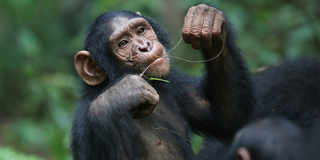Monkey invasion irk residents of Geita

What you need to know:
- Residents are urging the government to take immediate action to remove or control the monkey population before they cause harm.
Geita. Residents of Mtakuja and Kalangalala Wards in the Geita Town Council are sounding the alarm over increasing invasions by monkeys that are entering their homes to steal food, creating safety concerns, especially for families with young children.
Locals have reported a significant rise in monkey activity coming from the forest surrounding the Geita Gold Mine (GGM).
They say that when doors and windows are left open, the monkeys boldly enter homes without fear, searching for food.
Musa Nyaronyo, a resident of Kagera Street, shared his alarming experience, stating, “Just the other day, a group of more than six monkeys entered my house. When they found nothing outside, I stayed inside watching them come in without fear; they climbed up and took ugali. I was shocked because it’s strange to see monkeys acting like humans.”
Eveline Sabuka, a resident of Compound Street, echoed these concerns, stating that the frequent invasions have put their children's safety at risk.
Residents are urging the government to take immediate action to remove or control the monkey population before they cause harm.
The councilor for Kalangalala Ward, Prudence Temba, emphasized the urgency of the situation, calling for swift measures to either relocate or eliminate the monkeys to ensure public safety.
The Natural Resources Officer for the council Lee Kiangala, explained that the primary cause of the monkey invasions is environmental destruction stemming from human activities, particularly deforestation in the Geita forest.
He noted that over 50,000 hectares of this forest have been severely damaged, forcing wildlife, including monkeys, to migrate into areas inhabited by people.
“The remaining forest area is GGM, which is protected, making it difficult for residents to enter. As a result, the monkeys have moved there and multiplied, now entering neighborhoods in Ikumbayaga, Nyamalembo, Nyanza, and Kenro,” Kiangala stated.
To address this growing problem, Kiangala said that they have contacted the Tanzania Wildlife Research Institute (Tawiri) to assist in relocating the monkeys to the Moyowosi Reserve. The operation is set to begin soon and will take 17 days.
He urged residents to protect the environment and refrain from indiscriminate tree cutting, which drives wildlife into human settlements.
As the situation develops, local leaders and residents hope that effective measures will be implemented to safeguard their communities from further invasions.





